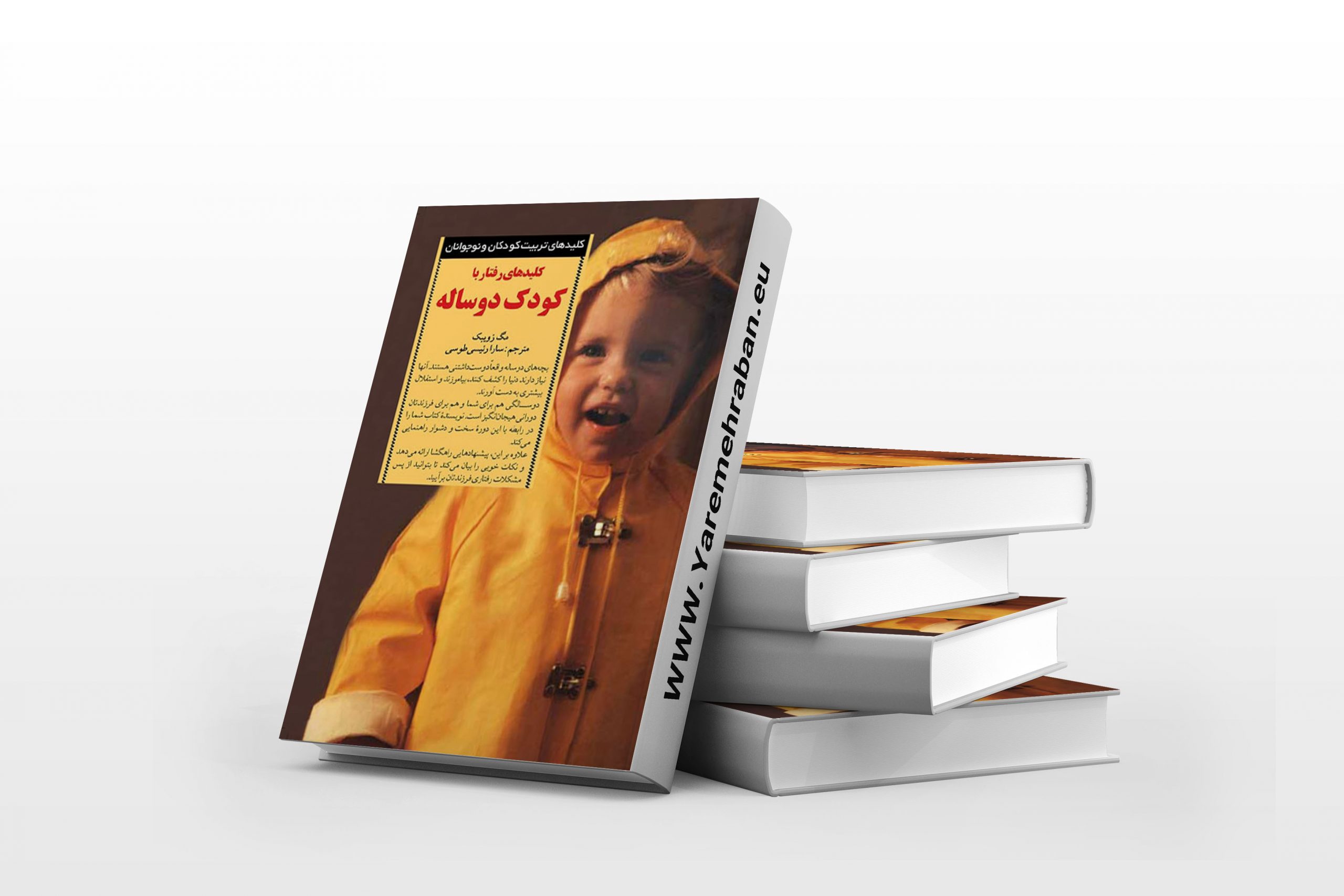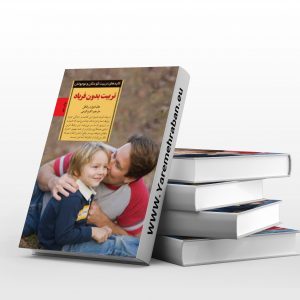Description
T Keys to parenting your two -year old is written by Meg Zweibek, a nurse and child psychologist.
Two-year-olds are really exciting and lovable, and at least sometimes you can enjoy being with them. But the problem is that these kids need to explore the world, learn, and become more independent.
But they still need the care of their parents to prevent any physical, mental or emotional harm. When two-year-olds try to discover the world around them, they can not understand the consequences of their actions. Will they endanger their own safety or the peace of mind of their parents? When two-year-olds want to learn new things, they often expect to be constantly noticed by their parents. In this book, you will get acquainted with the many changes of your two-year-old child during the coming year.
In the book The Keys to Dealing with a Two-Year-Old, you will learn about the many changes your two-year-old has made over the coming year.
The first part of the keys to dealing with a two-year-old describes how your two-year-old will grow and change, how he or she will grow and change in relation to you, how he or she will think and how he or she will use his or her senses and physical skills to learn. This chapter contains the keys that examine the impact of your child’s developmental stages on his or her behavior during these daily activities.
You can read each of the keys in this section independently, but if you read all the keys, it will increase your ability to understand your two-year-old. The developmental process of children is different from each other, and in each child, different aspects of development have different effects. The developmental stages of children are sometimes leaps and bounds and sometimes very small steps.
The second part describes the keys to dealing with a two-year-old child, “temperament style”, the different behavioral differences of children by mentioning its details. All biennials eventually go through the same growth stages, but each goes through this stage in a unique way. If you learn to understand your child’s style, you will feel less upset about being different from other children and about yourself.
In the third section of Behavior in a Two-Year-Old, “Behaviors and Misbehaviors of a Two-Year-Old,” you will learn about the different behaviors you can expect from your child over the next year. This section tells you how your child’s behaviors and misconduct form part of his or her developmental stages and teaches you ways to overcome and enjoy the challenges that this not-so-terrible period creates in your life.
Excerpts from the book Keys to Dealing with a Two-Year-Old
Two-year-olds often ask a repetitive question over and over, and parents think their answer may not have been satisfactory. But sometimes two-year-olds repeat a question simply because they like the answer you gave them the first time and enjoy talking to you!
Narges
When your child is being abused, try to divert their attention instead of reprimanding them. Rather than just reminding him of the things we want him to do, it is better to tell him the things we want him to do.
Two-year-olds gradually see themselves as important and separate from their parents, often expressing their independence in a way that makes them look bullying or make others nervous; The same characteristics that make two-year-olds sweet and lovable can cause parents to faint from fatigue at the end of the day!
Sadat
Some two-year-olds are created to work together some days. You may have to choose to wash his face or maintain your mental health! On such days, do not worry if your child looks messy. Disorder does not harm him in any way. Your relationship with him in other areas is much more important than his orderly appearance.
Sadat
Many times he does not even know what he wants from you. Many times, you do not even know you have to stop or give up. You have to learn from experience, because every child and every family is different.
Once your baby is familiar with these feelings, it is a good idea not to say anything about his or her dirty diapers. A two-year-old feels that what he has put in his diaper is a part of his being. If you frown and complain about changing her dirty diaper, she may feel that you do not like her either.
Instead, praise her when she tells you she needs to change, and if she brings a diaper or works with you when you change, say goodbye. Give a positive opinion about older children who use the toilet and wear shorts. But do not criticize toddlers who have diapers because your child will be worried that you will feel the same way about them.
In the past, parents believed that a child who was soon taken from the old was either very smart or had generous parents. We now know that the child’s behavior in this regard has nothing to do with his intelligence, and if he is pressured before the child is ready to use the toilet, it will cause him to revolt and resist education, so that if At first they waited for the child to get ready, his teaching work would be completed sooner.
Even though your beloved child seems to be listening to or even repeating your explanations, he or she will be able to understand something when he or she experiences it directly. For example, you might explain to him that if he drops his juice, the floor will get dirty, or if he drops the glass and the floor gets dirty, you will be upset about cleaning it, or if he drops his glass, you will not give him any more juice. Your child listens carefully but still tests to see if everything you say is true!
As your child approaches two and a half years of age, you may find that he or she plays scenes from his or her daily life and sometimes plays the role of a parent.
Two-year-olds need about thirteen hours of sleep in each 24-hour period.
One of the great challenges for two-year-old parents is finding a way to balance the needs of the child with the needs of the family.
To help your two-year-old use the concept of pairs and opposites in learning different topics in the future, you can play a lot of games with him. For example: pairing objects, counting and identifying similar and different objects. Although these concepts may seem simple, they are basic concepts for teaching reading and teaching math.
During this year, as your child learns to speak and understand speech, much of what he or she learns will be a reflection of your own verbal communication patterns.
Plan for her daily meals and snacks: Dairy products: Three servings a day, each with a glass of milk or yogurt and 30 grams of cheese. If your two-year-old has anorexia, reduce his milk to two glasses a day. Cereals: At least five servings a day, including bread, rice, pasta, cereals or other grains. The weight of dry matter should be fifteen grams per serving.
Thus, a glass of dry cereal and half a glass of cooked rice are nutritionally equal. Fruits: Two servings a day, including a medium-sized fresh fruit or 120 grams of fruit juice, plus 120 grams of fruit or juice rich in vitamin C. If your two-year-old drinks more than 300 grams of juice a day, he or she may no longer have an appetite for nutrients.
A two-year-old who has a regular bedtime routine sleeps much more easily than a child whose nightly schedule is unpredictable.
These repetitive and relaxing routines provide security for the baby and can help him fall asleep. Parents can also stay calm by limiting the amount of time they spend doing bedtime routines
Most two-year-olds can sleep without their parents in their crib or crib.
Parents can also stay calm by limiting the amount of time they spend doing bedtime routines. This is important because most parents have experienced that if their child is hurried or nervous at bedtime, he or she will be more resilient than cooperating with the parents.
Most two-year-olds can sleep without their parents in their crib or crib. If you stay with your child, make sure that your presence really helps him sleep or that it wakes him up. Some two-year-olds find that when they fall asleep, their parents walk away from them.
These children struggle with sleep so that their parents do not “disappear” and wake up every time their eyes fall asleep. Some other children fall asleep easily in the presence of their parents, but wake up in the middle of the night and call the parent to help them fall asleep again. If your child has this pattern at bedtime, read the relevant chapter, “Sleep and Nighttime Problems.”
Sometimes the differences we see between children are the result of their parents’ different parenting styles. But many times, these differences are the result of the innate characteristics of children that have existed in them since birth. From the time a baby is born, certain behavioral patterns can be observed in him that remain with him for the rest of his life and form part of his behavioral style.
You may have noticed that mothers and fathers whose children are less disciplined do not always understand why you can not be as spontaneous or flexible as they are.
Parents often take good behavior for granted and only react to abuse. The child also soon realizes that he can get more attention with rude behavior than with good behavior! Let your child know that you are paying attention to the positives
Imaginary conversation sometimes accompanies and cooperates with the child, but often plays the role of a “rude” child and allows him to do all the activities during the game that your child knows he should not do himself.
Your child should be able to express himself / herself in language by the age of two. You need to understand from the answer he gives to your words that he understands simple questions and commands. Although his vocabulary is limited, his words should be so clear that at least half of them are understood by non-family adults. At the beginning of the second year, such a speech is expected from the child. If your child does not speak at all by the age of two, his or her hearing and speech skills should be assessed.
He gradually uses pronouns like me, you, he, his, and probably confuses them many times, especially when talking about himself. He gradually grasps the prepositions like front, bottom and back
Instead of screaming in anger, speak in a firm, decisive tone. Most parents experience that if they take a few deep breaths or count to ten before saying something, they can better control their voice.
The most important activity for parents who want to encourage their child’s language development is to show that they are good at speaking and listening.
The best way for your two-year-old to learn is through direct experience.
Vegetables: Give him three servings a day, including two tablespoons of both dark green and yellow vegetables. Protein: Sixty grams daily, such as 30 grams of red meat and 30 grams of fish or a tablespoon of peanut butter and 30 grams of chicken.
If a child does not eat any animal protein, his diet should be monitored by a doctor. Use an iron source such as meat, legumes or grains to which iron has been added. If you provide the child with the ingredients in these food groups, his diet will be balanced and rich in nutrients needed for growth. If he eats two small servings of sweets or fatty substances, his appetite for nutrients will not decrease.
If your child seems to spill or throw his food when he is full, watch him carefully to notice the first sign of fullness. Say, “Well, are you full?” If so, cut the dishes. If he throws something before you ask, say the same thing in the news (“Well, you’re full”), cut the dishes and say “it’s over”, and drop him from your chair.
If he complains, you can give him food again as a test, but if you see him intentionally spilling or throwing food, it is better to ignore it. Some two-year-olds skip meals frequently when eating, not because they are full, but because they want to get their parent’s attention.
So what he sees on TV is as real as his daily life experiences.
The twenty-four-month-old speaks in simple language: utters many one-word phrases and several sentences and two-word phrases. He is very interested in naming people, things and things around him.
A two-year-old sometimes asks his parents incessantly, “What is this?” And it tires them out
His ability to express negative expressions also increases. He who at first only said “no” can not use words like do not, and never makes a sentence, for example, he can say: “This is not my car.”
Your child’s mind is bursting with new thoughts, information, and observations, and he or she eagerly wants to share all of this with you. That’s why he speaks. His language skills and vocabulary cannot meet his needs quickly.
This causes him to stutter. If you listen patiently and say, “I know what you want to explain to me is very exciting,” your child will learn to speak more calmly and thoughtfully without embarrassment.
This year, your two-year-old will learn to memorize children’s poems and sing. It can now speak up to 250 words. Uses many polysyllabic phrases and often makes sentences. He can associate names with “s”
. You can get ideas from the poems and games of these programs and use them to teach your child concepts such as counting, colors and categorizing objects.
He is more interested in the activity itself than in the results of the activity; That is, to the process of doing work and not to its purpose.
As you watch your child play, you will notice signs, which show you how he or she is learning to solve problems. Some children, even from the age of two, use certain approaches more than others. Some children are visually instructive.
They watch carefully before doing anything. Some are auditory learners, they ask questions and listen to explanations given by another adult or child. Some children are tactile learners and learn better by touching and opening objects. These kids need to work actively to solve a problem
Many children use a combination of all three approaches. If you pay attention to your child’s natural learning style, you can help him learn faster and enjoy it more.
Do not be embarrassed or defensive about your child’s reaction to new situations. If someone said to you, “Why is it so embarrassing?” Do not accept his words. Instead, say, “She is not shy. It only takes a little time. He sees things very well. “He is precise and focused, but his style is like that.” And say it in a way that your child hears.
Part of the book Keys to Dealing with a Two-Year-Old
The words of the publisher are the keys to dealing with a two-year-old child
Dear reader, the book in front of you is a volume of “Keys to Educating Children and Adolescents”.
The books in this collection, despite their thematic relevance, are each independent in terms of content. The method of the authors of the books is to teach practical methods to the parents. As a result, each book consists of several chapters, each of which explains a key approach.
The “Keys to Educating Children and Adolescents” collection, in addition to its scientific and authoritative support, has used simple language to explain the content and convey it to the reader, which can be used by all mothers and fathers.
The book “Keys to Dealing with a Two-Year-Old” examines the developmental stages of a child after the age of two, such as motor, communication and emotional skills.
Keys to parenting your two -year old
Also, the questions that are often asked by parents, especially young parents, are asked in a precise and comprehensive way and how to properly deal with their issues and concerns.
Keys to parenting your two -year old will grow and change
Two-year-olds are explorers looking for unknown worlds. There are scientists who study the wonders of nature, there are poets who invented language for the first time, and there are psychologists who think about the secrets of the behavioral differences of the people around them.
A two-year-old constantly uses his natural intelligence and curiosity to increase his knowledge. You, a two-year-old child, are amazed at how much he learns and how quickly he increases his knowledge. If we want to describe your child’s achievements during this year, we can not say “two-year-olds are so and so” because the two-year-old develops every week, increases his interests and strengths and learns full time.
Your two-year-old tries to be capable and independent without help
You take care of yourself. Sometimes, when you expect him to love you more than anyone, he distances himself from you and turns his back on you. Because he wants to declare his independence from you. This inner motivation, along with his endless curiosity, lays the foundation for learning in his future.
However, for you who have a two-year-old child, there come times when you see that your child has more energy and motivation than you! One of the great challenges for two-year-old parents is finding a way to balance the needs of the child with the needs of the family.
Your child needs to broaden their horizons, and parents need to create a space in the home and family that works well for both children and adults. Even when a child rejects his or her parents’ efforts to help and calm him or her, parents must patiently wait for the moment when their child’s opinion returns.
This chapter will introduce you to all the exciting changes you will see in your child during this year, so that you can make life safe, interesting and enjoyable for the whole family.
1. Independence
Take a few minutes to watch your two-year-old play. Observe her ability to move her body, solve a problem, use a toy, and talk to herself and you about what she is doing. Look at how he puts food in his mouth and demands more food, falls and gets up and tries. He does all this work alone.
Sometimes he wants help and sometimes he does not accept your help. It is clear that he is gradually becoming a capable and independent child.
Now think about the past.
Related books Keys to parenting your two -year old
1- Introducing the book Keys to parenting your two -year old on YouTube
2- Introducing the book Keys to parenting your two -year old in Aparat














Reviews
There are no reviews yet.